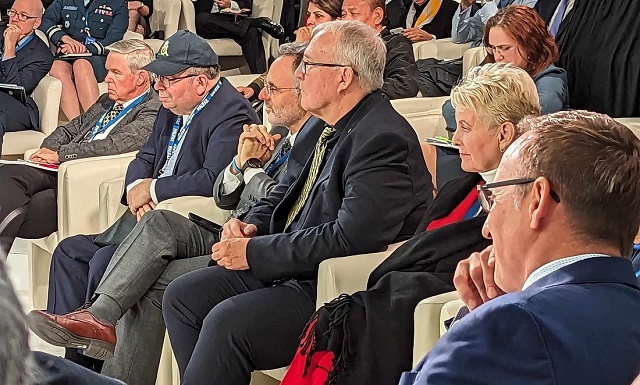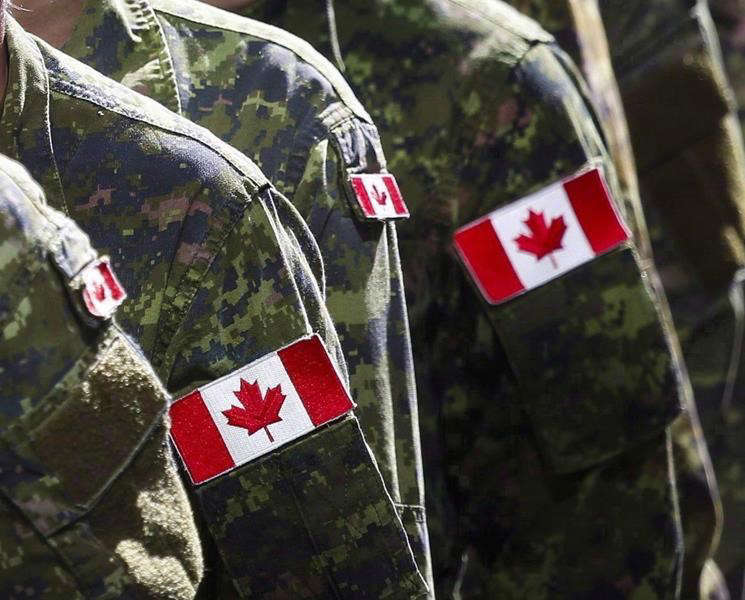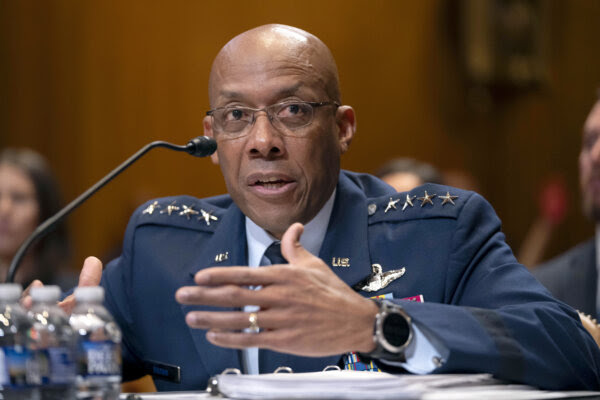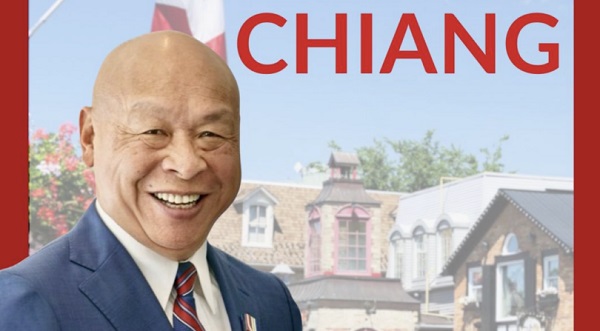armed forces
Things worth fighting for

US ambassador David Cohen, Israeli ambassador Iddo Moed, Bill Blair, Cindy McCain, Peter MacKay. Photo: PW
Click here to subscribe to The Paul Wells Newsletter.
Of course people disagree. That’s what we’re trying to protect
“You really like going to those things,” an acquaintance remarked at Pearson Airport when I told him I was heading to the Halifax International Security Forum. Fair enough, I guess. I was just in Warsaw for their annual gathering of generals, defence ministers, think tankers and diplomats. I was in Halifax a year ago, and occasionally in previous years. I’ve been to security conferences in Herzliyah and Munich, long ago. The world is always on the brink of war, and lately has taken to spilling over several brinks at once. So there is always much to discuss.
Unfortunately much of what there is to discuss is horrible. On Saturday a panel moderator slumped into a plush chair, in front of the assembled cabinet ministers, diplomats, generals and think tankers, and introduced himself as Jason Rezaian from the Washington Post. He looked like any newspaperman from Central Casting, which means, approximately, like me. He reminded the audience that in 2014 he was taken prisoner by the Iranian regime and held in a Tehran penitentiary for over 500 days.
On Saturday at dinner I was reminded that Huseyin Celil, a Canadian citizen, has been in a Chinese prison for 17 years. Vladimir Kara-Murza, who spoke at Halifax in 2021, has been in a Russian prison for close to two years.
Prison is not even close to the worst fate that can befall a journalist, a dissident or a population. Halifax this year was preoccupied with continuing slaughter: in Ukraine, where the optimism of last year’s conference has been displaced by mounting concern; and in Israel and Gaza.
This newsletter is my full-time job. To support my work, consider becoming a free or paid subscriber.
I’d been at the conference venue, a Westin hotel at the end of Hollis St., for perhaps ten minutes when a visiting soldier who knows Ukraine well told me that pushing the Russians all the way out of Ukraine — that is, out of Crimea and the eastern Donbas region — would take twice as many weapons and equipment as the West has sent Ukraine to date. This was the soldier’s way of engaging a debate opened by former NATO secretary-general Anders Fogh Rasmussen, who’s suggested bringing Ukraine into NATO without the regions currently occupied by Russia. This sounds easier, but as former Estonian president Toomas Ilves told me in an interview that will soon be on my podcast, a Russian Crimea and Donbas would essentially be permanent bases from which to harass the rump Ukraine.
So much for the heady optimism of a year ago, when fighting the Russians to a standstill still felt like some kind of triumph. Joe Biden’s promise to back Ukraine “for as long as it takes” is starting to sound ominously like a promise to keep up the West’s end of a stalemate. Several commentators at Halifax said that if all the weapons that were sent to Ukraine in 2023 had arrived in 2022, 2023 might have gone better. As for 2024, if it features mounting Ukraine fatigue in Western populations and ends with Donald Trump’s re-election, this year might look rosy in retrospect.
Of course the big complicating factor in any discussion of today’s world is Israel’s response to Hamas’s Oct. 7 attack. The conference agenda had plainly undergone substantial surgery to accommodate a discussion of the Gaza violence and its repercussions. A crowd of local pro-Palestinian protesters appeared at intervals across the street from the conference hotel, although they were loudest on Friday night when just about everybody attending the conference was at a dinner several blocks away.
My own sense is that the establishment and perpetual defence of a Jewish state of Israel is very partial payment toward the heavy debt humanity owes the Jewish people. I note that there was a robust and enduring ceasefire in Gaza as late as October 6, and that Hamas brought that ceasefire to a monstrous end. Hamas having opened hostilities, it falls to Israel to end them, by destroying Hamas’s ability to contemplate or deliver any similar attack in the future. Carrying out that task is inevitably an enterprise of horrifying violence.
Too much, say the protesters. “You support GENOCIDE,” they shouted outside the Westin Nova Scotian. I guess that’s going to depend on definitions. I had dinner on Saturday with Dolkun Isa, the president of the World Uyghur Congress, and I got the distinct impression he’s against genocide. Yet I have a hard time dismissing those protesters outright just because they weigh horrors differently from me. I have friends who seem to have spent the last six week gleefully looking for reasons to write off people who disagree with them. I’ve often thought moral clarity was overrated. Shouldn’t these questions be morally tormenting? And in a world where such lesser matters as vaccine mandates and carbon taxes become the stuff of furiously polarized elections, should we really be so surprised that life and death on a vast scale produces divisions too?
Share
I was nervous when I heard, late on Friday, that the Halifax Forum organizers were going to give their highest honour, a prize in the name of the late U.S. Senator John McCain, to “the people of Israel.” That sure wouldn’t go over well with the protesters outside the Westin. As it happened, by Saturday morning it was raining and the protesters were nowhere to be seen. More to the point, the prize went, not just to any people of Israel, but to Brothers and Sisters In Arms, an organization that spent much of 2023 protesting against Benjamin Netanyahu’s autocratic judicial “reforms,” but pivoted to assisting recovery efforts after the Oct. 7 attack. A neat way of emphasizing that Israel is a stubbornly pluralistic democracy, and that the Israeli state is not always the best steward of the Israeli people’s interest.
The conference, and the individual participants even more so, found other ways to express a diversity of opinion that might have surprised outsiders. (It’s easy enough to see for yourself: streaming archives of most of the sessions are on Youtube.) A panel with the title “Victory in Ukraine = Example For Israel” featured panelists politely disagreeing with the premise of the title. For starters, Ukraine had no settlements on occupied Russian territory, as one questioner in the audience pointed out.
Mouaz Moustafa, executive director of the Syrian Emergency Task Force, was one of several people at the forum who argued that the Israeli government’s heavy and deadly bombardment of Gaza is counterproductive at best. “Such a campaign, where there are thousands and thousands more children being killed than Hamas fighters, is not something that makes, frankly, Israel or the West safer,” he said.
This sentiment — that even when brutally wronged, Israel is not automatically right — was reinforced Saturday afternoon by the publication in the Washington Post of a long essay on Israel-Gaza by Joe Biden. Biden moved early to support Israel and ward off Iranian escalation, moving two aircraft carriers to the Mediterranean and himself to Israel. Now he was signaling — hell, saying in so many words — that his support had limits:
“There must be no forcible displacement of Palestinians from Gaza, no reoccupation, no siege or blockade, and no reduction in territory. And after this war is over, the voices of Palestinian people and their aspirations must be at the center of post-crisis governance in Gaza.
As we strive for peace, Gaza and the West Bank should be reunited under a single governance structure, ultimately under a revitalized Palestinian Authority, as we all work toward a two-state solution. I have been emphatic with Israel’s leaders that extremist violence against Palestinians in the West Bank must stop and that those committing the violence must be held accountable. The United States is prepared to take our own steps, including issuing visa bans against extremists attacking civilians in the West Bank.”
If Ukraine and Israel were the conference’s main themes, another repeated refrain was that bad things often come in threes, and war in Europe and the Middle East could become even grimmer if they were joined by conflict in the Asia-Pacific. Several speakers referred to China as the West’s “pacing threat,” which essentially means only China has the means and desire to compete with the West in shaping the world.
It was in this context — of a world growing constantly more dangerous in constantly more complex ways — that so many hallway conversations in Halifax featured variations of the observation that Canada is increasingly close to being a failed state. It sure would be great if Canada could contribute reliably to dissuading Chinese ambitions in the Asia-Pacific, but that would require a working navy, and Wayne Eyre told the conference we’re fresh out. Bill Blair, Justin Trudeau’s latest defence minister, met the large U.S. congressional delegation that always flies up to Halifax from Washington, and I’m told most of the questions had to do with his department’s annual Performance Report, which says that over the past year, “the growing demands for CAF responses challenged the already unstable foundation of operational readiness given personnel shortfalls, equipment deficiencies, and insufficient sustainment including critical stores of ammunition.”
Blair said at the conference that Canada needs to make “significant new investments” in defence; he was also heard to say, in private meetings, that in delivering this message within the government he faces “headwinds from the centre.” The headwinds will be portrayed on Tuesday, in a closely-watched speech, by Chrystia Freeland, who was said to be so displeased with Anita Anand’s constant push for more defence spending that soon both Anand and Blair had new jobs. Nearly every ambassador in Ottawa begins nearly every conversation by asking whether the Trudeau government or any potential successor will take the burdens of a troubled world more seriously anytime soon. Of course, Canada being a sovereign country, these decisions are not made by ambassadors. But they get to ask, and notice.
I suspect Freeland’s delivery of her economic and fiscal update will be one of the most important political moments of the last five years. Nobody really has any idea what the minister’s statement will say. She is the champion of activist government on odd-numbered days and of mighty fiscal restraint on even. She will be sure of some new direction on Tuesday, and I suppose it’s a toss-up whether she will even remember by Friday what that direction was supposed to be. The good news, as we were reminded in Halifax, is that Canada is close to being the least of the world’s problems. The bad news is that it also seems determined to become the least of the world’s remedies.
Paul Wells has written for the Toronto Star, the National Post, and the Montreal Gazette. Perhaps most Canadians know him best for the 19 years he spend writing long form journalism with Maclean’s magazine and for his regular appearances on CBC’s The National.
armed forces
Canada’s Military is Collapsing. Without Urgent Action, We Won’t Be Able To Defend Ourselves

From the Frontier Centre for Public Policy
By David Leis
Decades of underfunding and political neglect have left our military weak and unprepared
What Lt.-Gen (retired) Michel Maisonneuve (ret.) told me about Canada’s military was nothing short of alarming. He didn’t mince words—our armed forces are in dire straits. If we don’t act now, Canada will not only be unable to defend itself, but it will cease to be taken seriously by our allies, many of whom are already losing patience with our military decline.
Maisonneuve has seen firsthand what a functioning military looks like. He has served at the highest levels, working alongside our allies in NATO, and he knows exactly what Canada is failing to do. “We are no longer at the table when major defence decisions are made,” he told me. “The Americans don’t ask us what we think anymore because they know we can’t contribute.” That is a stunning indictment of where we now stand—a country that was once respected for its ability to punch above its weight militarily has been reduced to an afterthought.
The problem, as Maisonneuve laid out, is both simple and staggering: Canada doesn’t take its defence seriously anymore. The government has allowed our forces to wither. The Air Force is still buying CF-18s from the 1980s because the long-delayed F-35 procurement is years behind schedule. The Navy, once a competent maritime force, is barely functional, with no operational submarines and a fleet that is nowhere near what is needed to patrol our vast coastlines.
Meanwhile, the Army is struggling to recruit and retain soldiers, leaving its numbers dangerously low. “We have an Army in name only,” Maisonneuve said. “If we were called upon tomorrow to deploy a fully operational combat force, we couldn’t do it.”
Even more shocking is the state of readiness of our troops. A recent report found that 75 per cent of Canadian military personnel are overweight. Maisonneuve didn’t sugarcoat it:
“It’s unacceptable. We are supposed to be training warriors, not watching fitness standards collapse.” When the people entrusted with defending our country are struggling with basic physical fitness, it speaks to something much deeper—an institutional rot that has infected the entire system. Our allies have noticed. Canada was locked out of AUKUS, the military alliance between the U.S., the U.K. and Australia. “It wasn’t an oversight,” Maisonneuve explained. “It was a deliberate snub. The Americans don’t see us as a serious defence partner anymore.” That snub should have been a wake-up call. Instead, our government shrugged it off.
Meanwhile, Washington is openly questioning Canada’s value in NATO. The Americans see the numbers—Canada refuses to meet even the minimum defence spending requirement of two per cent of GDP. Instead of fulfilling our obligations, we offer up empty promises and expect others to pick up the slack.
Maisonneuve is blunt about what needs to be done. “First, we need to fully fund the military—and that means not just hitting the NATO target but exceeding it. Our allies spend real money on their defence because they understand that security is not optional.” He suggests Canada should aim for at least 2.5 per cent of GDP, not just as a show of commitment but as a necessity to rebuild our capabilities. Beyond money, Maisonneuve argues that military culture must be restored.
“We’ve allowed ideology to creep into the ranks. The military’s primary function is to defend the nation, not to serve as a social experiment,” he said. “We need to get back to training warriors, not worrying about whether we’re ticking the right diversity boxes.” He believes a return to a warrior ethos is essential— without it, the military will remain directionless.
Procurement is another disaster that Maisonneuve insists must be fixed immediately. “We’ve spent years dithering on replacing equipment, and every delay puts us further behind,” he said. The F-35 deal should have been signed years ago, but political hesitation means we won’t see a full fleet for years. The Navy urgently needs new submarines and icebreakers, especially to secure the Arctic, where other global powers, particularly Russia, are ramping up their presence.
The biggest issue, though, is manpower. “We need to rebuild the forces, period,” Maisonneuve told me. “That means recruiting, training, and retaining soldiers, and we are failing at all three.” He even suggested that Canada should consider implementing a national service requirement, a move that would not only increase troop numbers but also instill a sense of duty and responsibility in younger generations. “We used to be a country that took security seriously,” he said. “What happened?”
That’s the question, isn’t it? What happened to Canada? How did we go from being a country that contributed meaningfully to global security to one that can’t even defend itself? The reality is that successive governments have let this happen—first by neglecting funding, then by letting bureaucracy suffocate procurement, and finally by allowing the core purpose of the military to be diluted.
Maisonneuve is clear: Canada must act now, or it will cease to be taken seriously.
David Leis is President and CEO of the Frontier Centre for Public Policy and host of the Leaders on the Frontier podcast
armed forces
Trump fires chairman of Joint Chiefs of Staff, appoints new military leader


From the Daily Caller News Foundation
By Mariane Angela
President Donald Trump announced Friday the dismissal of General Charles Brown, the current Chairman of the Joint Chiefs of Staff.
In a post on Truth Social, Trump expressed his gratitude toward Brown for his extensive contributions and leadership, wishing him and his family a prosperous future. Brown’s departure marks a pivotal moment in U.S. military leadership following over 40 years of service.
“I want to thank General Charles “CQ” Brown for his over 40 years of service to our country, including as our current Chairman of the Joint Chiefs of Staff. He is a fine gentleman and an outstanding leader, and I wish a great future for him and his family,” Trump wrote.
Simultaneously, Trump introduced his nominee for Brown’s successor.
“Today, I am honored to announce that I am nominating Air Force Lieutenant General Dan “Razin” Caine to be the next Chairman of the Joint Chiefs of Staff. General Caine is an accomplished pilot, national security expert, successful entrepreneur, and a “warfighter” with significant interagency and special operations experience,” Trump said.
Trump said Caine’s appointment comes after he was overlooked for advancement during former President Joe Biden’s presidency.
“General Caine was passed over for promotion by Sleepy Joe Biden. But not anymore! Alongside Secretary Pete Hegseth, General Caine and our military will restore peace through strength, put America First, and rebuild our military,” Trump said. President Trump also announced plans to appoint five additional senior military officials, tasks he has delegated to Secretary Hegseth.
It was reported Thursday that Hegseth plans to dismiss Brown as part of President Trump’s commitment to eliminate “wokeness” from the military. Brown reportedly appears on a list of proposed removals submitted to Congress.
Brown had previously expressed his wish to retain his position even after Trump took office, and according to sources speaking to NBC News in Dec. 2024, Trump seemingly moderated his views on the general. Biden nominated Brown as chairman in 2023, and despite a heated confirmation hearing where senators scrutinized his alleged implementation of racial quotas in Air Force hiring practices, he was confirmed.
Meanwhile, Brown’s replacement, Caine, took office as the associate director for Military Affairs at the CIA on Nov. 3, 2021, after serving as the director of Special Programs at the Pentagon. Lt. Gen. Dan Caine, an F-16 pilot with extensive experience including over 150 combat hours, was commissioned in 1990 and has held numerous key roles, from the White House staff to special operations, and balances his military career with entrepreneurial ventures.
-

 Business2 days ago
Business2 days agoCalifornia planning to double film tax credits amid industry decline
-

 2025 Federal Election2 days ago
2025 Federal Election2 days ago‘I’m Cautiously Optimistic’: Doug Ford Strongly Recommends Canada ‘Not To Retaliate’ Against Trump’s Tariffs
-

 Business2 days ago
Business2 days agoCanada may escape the worst as Trump declares America’s economic independence with Liberation Day tariffs
-

 Alberta2 days ago
Alberta2 days agoBig win for Alberta and Canada: Statement from Premier Smith
-

 Catherine Herridge2 days ago
Catherine Herridge2 days agoFBI imposed Hunter Biden laptop ‘gag order’ after employee accidentally confirmed authenticity: report
-

 Business1 day ago
Business1 day agoB.C. Credit Downgrade Signals Deepening Fiscal Trouble
-

 COVID-1923 hours ago
COVID-1923 hours agoTrump’s new NIH head fires top Fauci allies and COVID shot promoters, including Fauci’s wife
-

 2025 Federal Election2 days ago
2025 Federal Election2 days agoLiberal MP resigns after promoting Chinese government bounty on Conservative rival







